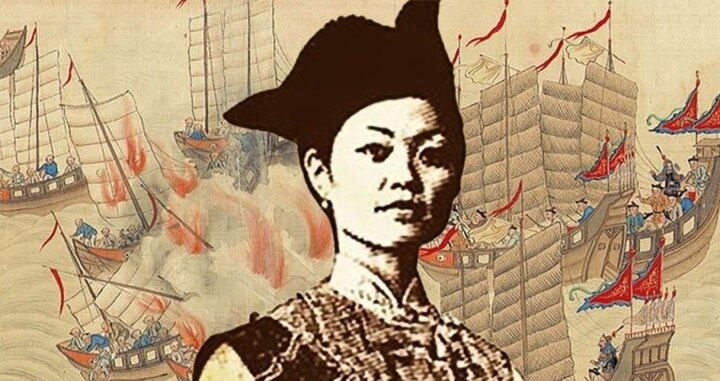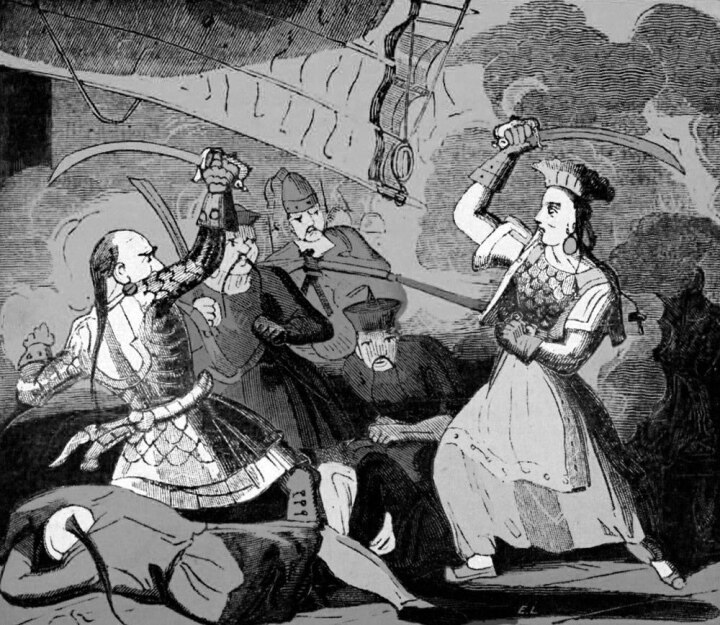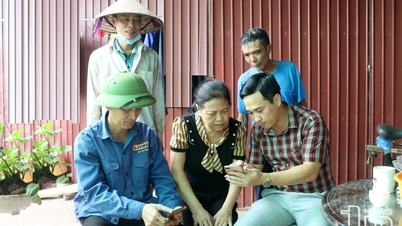Zheng Shi's real name was Shi Xiu Gu, born in 1775 in Guangdong, southern China. To make a living, Xiu Gu worked as a prostitute in a brothel in Guangzhou. In 1801, Zheng Yi, the leader of the Hongqi pirate gang, met Xiu Gu and married her.
Notorious female thief
In 6 years, under the management of Trinh Nhat and his wife, the Hong Ky gang grew from 200 ships to 1,800 ships, with their identities distinguished by the red, black, white, blue, yellow, and green colors on the sides of the ships. Hong Ky also joined forces with the Ngo family's pirate gang to form the Guangdong Pirate Alliance.

Portrait sketch of Trinh Thi. (Photo: Sohu )
In 1801, Zheng Yi died, most likely due to a storm at sea, and the inheritance of the fleet was passed to Zhang Bao, his adopted son. However, just a few weeks later, Zheng Shi decided to become Zhang Bao's lover, and implicitly took command of the Red Flag pirate fleet with more than 1,800 ships and about 50,000 followers.
For comparison, the famous pirate Blackbeard of her time commanded 4 ships and 300 pirates, while the US Navy at that time only had 5,000 sailors.
For ease of management, Trinh Thi gave the position of fleet captain to the deputy commander-in-chief Truong Bao, while she was in charge of business and military strategy for the entire pirate army. Managing such a large force of outlaws was not easy. To unify the management of her fleet, Trinh Thi established a set of rules that applied to all pirates under her command, along with harsh laws to punish those who did not comply.
For example, Trinh Thi stipulated that any pirate who disobeyed orders would be beheaded on the spot. This female pirate commander also proposed other harsh punishments such as cutting off the ears of deserters, beating them with iron clubs, etc. All captured war booty had to be returned to the fleet for equal distribution, with ships directly involved in the looting only receiving 20% of the value.
The code also had very strict regulations on the treatment of female prisoners. When women were captured from merchant ships, those of mediocre beauty would be released immediately to the mainland, while the beautiful girls would be auctioned off to pirates on board.
Anyone who bought a female prisoner would have to marry her and live with her for the rest of their lives. If they cheated on her, they would be executed. Pirates who raped female prisoners were also beheaded on board, and if the premarital sex was consensual, both would be sentenced to death.
Trinh Thi's Red Flag pirate fleet raged in the southern seas, down to Malaysia, even controlling many coastal villages from Macau to Guangzhou, imposing taxes on the people living in these villages.
Trinh Thi's pirate ships attacked and robbed everyone, from Chinese merchant ships to British and Portuguese naval ships. The Qing Dynasty sent troops to attack many times, the Portuguese navy and warships of the East India Company also participated in the suppression of this pirate army, but all failed because the Red Flag fleet's force was too large.
A Manchu naval admiral submitted a memorial to the imperial court reporting on this army as follows: "The pirates are too strong, we cannot control them by force."
After three years of continuous fighting at sea, the imperial army still could not subdue Trinh Thi's pirate fleet. However, the pirates also began to split and split into two branches, the Red Flag and the Black Flag. Under great pressure from the imperial army, the Black Flag group agreed to surrender. Realizing that continuing to use force to surround and capture Trinh Thi would not be able to subdue her, the Qing court had to give in and negotiate to persuade this female pirate to surrender in 1810.
Wash your hands and hang up your sword
The Qing court sent the governor of Liangguang to negotiate with the pirate Zhang Bao, but the negotiations soon reached a deadlock due to the Qing's insistence that the pirate leader kowtow to the imperial guards, as well as disagreements over how to handle the loot.

Description of Trinh Thi fighting with the royal court. (Photo: Sohu )
Trinh Thi decided to take action herself, leading 17 women and children to the governor's palace with her bare hands to negotiate. Both sides came to an agreement that Trinh Thi would be allowed to keep all the stolen property in exchange for submitting to the court.
The demand for kowtow was resolved by the governor of Liangguang acting as the officiant at the wedding between Zheng and Zhang Bao, having the couple kneel before the governor as a form of gratitude. At that point, Zheng's pirate career was effectively over.
After submitting to the court, 126 of her pirates were executed, 400 were exiled, and the rest were released or enlisted in the army. Trinh Thi and Truong Bao had a child together.
When Zhang Bao died, Zheng Shi returned to Guangzhou to open a casino, and continued the business until her death in 1844, at the age of 69.
HONG PHUC (Source: Atlasobscura)
Useful
Emotion
Creative
Unique
Wrath
Source



































































































Comment (0)